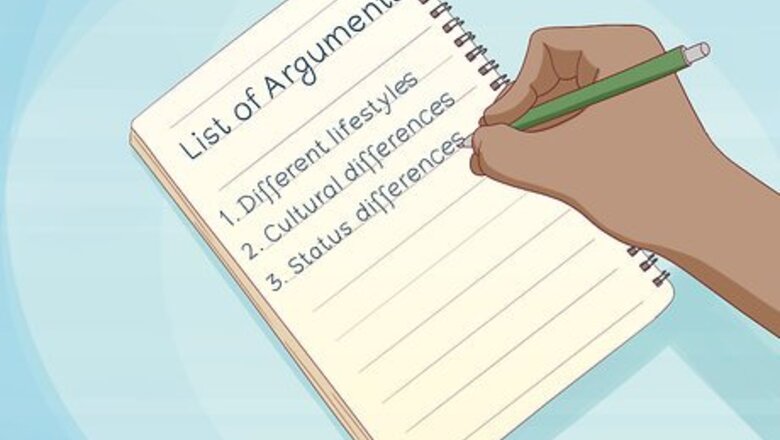
views
X
Research source
If you’re in love with someone from another caste, you may be struggling to figure out how to tell your parents. Before you bring up the subject, gather evidence and examples to show why you think your relationship will work. Once you’re ready to talk to your parents, choose a time when everyone is calm and you can chat with them uninterrupted. Although the conversation is bound to get emotional for everyone, do your best to stay respectful and level-headed.
Building an Argument

Write down a list of arguments you’d like to make. Once you have some ideas about how you want to make your case, write them all down so that you don’t forget. Go over each argument you think your parents are likely to make and come up with a strong counterpoint. If possible, come up with specific evidence or examples to back up your arguments.Keep in mind: Many intercaste couples face legitimate challenges, so be prepared to acknowledge that. Instead of trying to simply dismiss all of your parents’ concerns, let them know that you and your partner are willing to face and deal with the inevitable difficulties that will come with your relationship. For example, if your parents think that couples from different castes can’t get along because of lifestyle or cultural differences, come up with a list of all the things you and your significant other have in common.

Try to figure out in advance what your parents’ concerns will be. You may already have a good sense of what your parents’ arguments against an intercaste relationship will be. If not, try asking a few questions so that you understand exactly why they object to the idea. Then you can work on building some counterarguments. For example, maybe your parents are worried about how other family members would react, or perhaps they think an intercaste marriage in the family would have a negative impact on their status in the community. If you’re not ready to bring up your situation with your parents directly, try to think of ways to ask them how they feel indirectly. For example, try bringing up another inter-caste couple you know and see how they react. You could say, “Did you hear my friend Aditya is finally marrying his girlfriend?” Your parents might respond with something like, “It’s going to be so difficult for their children! How will they know what caste they belong to?”

Look for examples of successful intercaste couples. If you can find good evidence that intercaste relationships can work out, it may help sway your parents’ opinion. Look at your extended family or circle of family friends and see if you can find any intercaste couples among them who are happy and successful. You can strengthen your argument even more by finding examples of same-caste couples you know who are unhappy or unsuccessful. Try to pinpoint reasons not related to caste for the success (or lack of it) in these relationships. For example, try to demonstrate that the couples with compatible personalities or similar interests do better than the ones who are together based on caste.

Ask a sympathetic relative or family friend to back you up. If you have an open-minded relative or family friend who is close to your parents, try talking to them before you approach your parents. Having an ally whose opinions your parents respect can make a big difference. Pick someone your parents consider mature and whose judgment they’re likely to trust. If you can, introduce your partner to your friend or relative so they can get to know them and vouch for their character.
Talking to Your Parents

Choose a time when you and your parents are calm. If your parents are busy, under a lot of stress, or upset with you about something, don’t try to bring up the topic of your intercaste relationship right away. Wait until they are relaxed and will have plenty of time to chat with you without being distracted or interrupted. For example, if your parents both work, consider waiting until they have a day off to relax at home.

Approach your most sympathetic parent first if they have different opinions. You might be closer to one parent than the other, or one of them might be more open-minded about intercaste relationships. If this is the case, try talking to your more sympathetic parent first. If you win one parent over, they might be able to convince the other on your behalf. Don’t try to pit your parents against each other, however. You want them to come together in support of your relationship, not take sides and fight over the issue.

Build up to the subject of your intercaste relationship gradually. If you spring your intercaste relationship on your parents suddenly, it may come as more of a shock to them. Try easing into the subject slowly, over several conversations if necessary. For example, you might start by talking to them generally about the subject of intercaste relationships and how you feel about them. Alternatively, you could start by talking positively about your friend from another caste (without letting it drop right away that you’re more than friends). Don’t lead off with a big surprise, like telling them you just got engaged to someone from a different caste.

Do your best to stay calm if your parents argue with you. Once you let your parents know that you’re in love with someone from another caste, they may be upset, concerned, angry, or disappointed. If they react emotionally, try to stay calm. This will help you come across as reasonable, mature, and level-headed. If you find yourself getting worked up, force yourself to breathe deeply and focus on the sensation of your breathing. You may feel the urge to blurt out an angry or defensive response. Instead, try counting to 5 silently before you speak.

Listen to what your parents have to say and validate their feelings. However your parents feel about your intercaste relationship, they’ll likely have a lot to say about the matter. Resist the urge to interrupt or simply dismiss what they have to say. Instead, listen carefully, hear them out completely, and let them know you understand their concerns. After letting them have their say, say something like, “I understand why you feel that way, and I think you’ve made some good points. I know you care about me and you’re trying to look out for my interests.” Avoid saying things that sound accusatory, like “You’ll never understand me! You’re so stubborn and old-fashioned!” Your parents will be more likely to listen to you if they feel like you respect their point of view.

Present your counterarguments in a clear and logical way. Once your parents have had their say, calmly present your side of the argument. Let them know that you understand their objections to the relationship, but then offer your evidence against those objections. If they have questions, do your best to answer them openly and honestly. For example, if your parents are concerned about what your peers will think, try saying, “I understand that a lot of people in our town are still very traditional, but attitudes are changing. Most younger people now are okay with intercaste marriages.” Don’t try to manipulate your parents by begging them to change their minds or threatening drastic consequences if they don’t. This will only create more tension and resentment between you.

Propose a meeting between your parents and your significant other. If your parents meet your partner and get a good impression of them, this may help change their minds. If your parents aren’t too upset about the whole situation, ask if they’d be willing to meet at least once so that they can see what a wonderful person your partner is. A meeting will be a good opportunity for your parents to see how well the two of you get along and to get a sense of your partner’s character.Tip: Another possibility is to introduce your parents to your partner as a friend first before explaining that you are in love. This will give them a chance to get to know your partner without their judgment being clouded by concerns over your relationship.



















Comments
0 comment